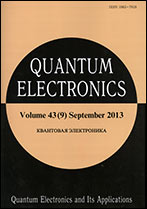|
Brief Communications
Collisional broadening of the P20 line of the 0001–1000 transition in CO2 measured with the aid of a tunable CO2 laser
L. S. Vasilenko, A. A. Kovalev, A. S. Provorov, V. P. Chebotaev
Abstract:
The profile of the P20 absorption line of the 0001–1000 transition in CO2 was recorded using a tunable high-pressure CO2 laser. The pressure dependence of the broadening of this profile was determined directly. The collisional broadening constant was found to be 7.56 MHz/mm Hg. The experimental profile was in good agreement with the theoretical Voigt form.
Received: 20.05.1975
Citation:
L. S. Vasilenko, A. A. Kovalev, A. S. Provorov, V. P. Chebotaev, “Collisional broadening of the P20 line of the 0001–1000 transition in CO2 measured with the aid of a tunable CO2 laser”, Kvantovaya Elektronika, 2:11 (1975), 2528–2530 [Sov J Quantum Electron, 5:11 (1975), 1382–1383]
Linking options:
https://www.mathnet.ru/eng/qe12141 https://www.mathnet.ru/eng/qe/v2/i11/p2528
|


|





 Contact us:
Contact us: Terms of Use
Terms of Use
 Registration to the website
Registration to the website Logotypes
Logotypes








